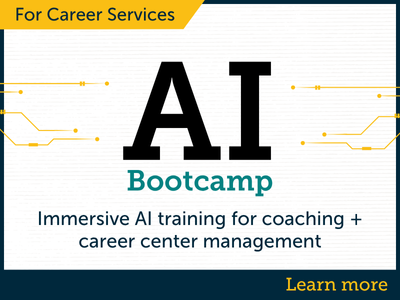According to a story dating to 15th century Japan, a ruler was dissatisfied with the looks of a repair job made to his broken tea bowl, which prompted craftsmen to create an alternative approach, called “kintsugi,” which literally translates as “gold joining.” This style emphasized, rather than attempting to conceal, the breaks and cracks in the object by joining them with an adhesive substance containing a precious metal, such as gold or platinum. The result is an object that is more interesting and aesthetically pleasing than its original, unbroken state.
The kintsugi technique is just one example of how imperfections can enhance rather than diminish an object’s value. Similarly, an antique tapestry with stitching that, under a microscope, appears slightly irregular and uneven in spots confirms that the tapestry was hand-stitched and therefore more valuable than one that was machine-made.
Clearly, perfect doesn’t always mean better. Yet, many job-seeking students despair over the slightest imperfections or gaps in their backgrounds, convinced that these shortcomings will create formidable obstacles to landing that dream internship, full-time position, or graduate program. In reality, the process of dealing with life’s little (and not so little) bumps in the road makes for a stronger candidate.
“I think students today have a mindset that shortcomings or failures are taboo when job hunting,” says Julie Thornton, who has worked as an executive coach and now serves as the associate director of the Booth School of Business for the University of Chicago. “The truth is that failures are tremendous ‘growth opportunities’ that provide a great story in building resilience. After all, we learn from failure, but we learn nothing from not trying.”
The personal resilience narrative starts as soon as a student starts to lay out their resume. By taking a fresh look at the descriptions of their projects, research, summer jobs, activities, and so forth, the student can enhance their resume by including information about any challenges or obstacles that may not have been previously mentioned, such as picking up a new programming language on the fly or adjusting to working remotely. Unforeseen circumstances such as the pandemic can also be highlighted, particularly if those circumstances forced an employer to make some last-minute changes to internship tasks. Unexpected/unforeseen events represent opportunities to showcase a student’s ability to handle change—a valued ability for most positions—and shouldn’t be neglected on a resume.
Students should also be reminded that it's important to highlight personal challenges when interviewing. Behavioral interviews provide great opportunities to do this. When preparing for these types of interviews, students should keep in mind that recruiters are looking for what they learned from unsuccessful experiences as much as what they accomplished during successful ones. Often the best example of a particular skill or strength is the one when a particular goal wasn’t reached or particular task was not completed—as long as the reasons why are able to be identified and articulated, as well as any lessons learned.
Similarly, answering the dreaded “What are your weaknesses?” interview question need not be as stressful to answer, as long as the student keeps the focus on their resilience and ability to learn from experience. Recruiters are looking for authentic responses to this question—it’s never a good idea to offer an answer that sounds like a strength (“I give 120% 24/7, and I sometimes assume that everyone else does the same.") By being forthright in acknowledging an area that they’ve been working on improving, e.g., grades, time management, coding skills, and then describing the steps that taken to get better, e.g., tutoring, using a planner, taking online programming challenges, the student can provide an authentic response that demonstrates their ability to learn and grow.
This same principle applies in technical interviewing. If a student doesn’t know something, it’s always better to let the recruiter know and to ask for hints, rather than trying to bluff through the problem. Acknowledging that they need assistance and asking for help is a sign of strength, not weakness.
An ability to recover and to learn from setbacks is a skill highly prized by most employers—highlighting that ability in communications with recruiters will result in more productive job-search campaigns.







